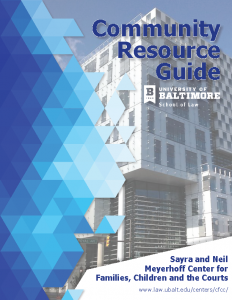
Spencer Hall, TCP Attorney
By Spencer Hall, TCP Attorney
On April 11, 2022, the Maryland General Assembly concluded its 444th legislative session having considered a wide range of issues impacting Maryland’s children and families. In keeping with CFCC’s mission to create, foster, and support a national movement to integrate communities, families, and the justice system to improve the lives of families and the health of the community, our team supported several legislative initiatives this year.
CFCC Faculty Director Shanta Trivedi testified in support of multiple bills addressing family separation before the House Judiciary Committee.
Shanta testified in support of House Bill 338 – “Child Abuse and Neglect – Definition of Neglect,” which sought to remove from the definition of neglect “failure to protect” a child from witnessing violence, failure to leave an abusive relationship, and failure to report the violence or to seek an order of protection. Her testimony highlighted the complicated reasons why survivors may not leave abusive relationships and noted that:
A definition of neglect that historically has included “failing to protect” a child from witnessing violence is unconscionable. Such a law tells women who are themselves subject to violence and control by another person that they should somehow be able to control the perpetrator’s actions to protect their children. It incorrectly places blame on the blameless and also sends a message to children that their non-perpetrator parent is at fault. Further, it places children at risk of removal from not one, but both of their parents. Domestic violence experts have expressed that this can be more traumatic than doing nothing at all. Such an approach is antithetical to the stated goal of the child welfare system–protecting children.
Shanta also testified in favor of HB454 – “Correctional Services – Pregnancy and Postpartum Support (Prevention of Forced Infant Separation Act).” This bill would have allowed infants to stay with their incarcerated mothers for the first year of the infants’ lives, and would have provided for liberal visitation thereafter with both the mother and with the other parent. Shanta’s testimony highlighted the fact that infant-parent bonding is crucial for developing healthy attachments. Disrupting an infant’s attachment to their primary caregiver can have negative long-term impacts on the child’s behavioral, emotional, and mental health. Further, for many children who have incarcerated mothers, the alternative to remaining with an incarcerated mother is placement in foster care. Shanta testified that based on research for her article The Harm of Child Removal:
Foster children have worse outcomes than their peers on nearly every metric, from education to poverty to behavioral and mental health. They are also more likely to become incarcerated themselves, furthering a vicious cycle. And given that half of Maryland’s prison population is Black, and nationally, the fastest growing prison population is women, this bill will have the most positive impacts on Black children.
Shanta testified before the House Judiciary Committee and CFCC Executive Director Rebecca Stahl testified before the Senate Judicial Proceedings Committee in favor of House Bill 1325 and Senate Bill 772, respectively – “Child in Need of Assistance – Neglect – Marijuana Use.” The bill would have clarified that marijuana use by a parent is not sufficient grounds for a finding of neglect, and would require a clear nexus between the parent’s marjiuana use and harm to the child. As Rebecca’s testimony pointed out, “[m]any children are prevented from reunifying with their parents who test positive for marijuana when the initial finding of neglect and removal was unrelated to marijuana use, the parent never used around their child, and there is no evidence the parent’s marijuana use is harmful to the child.”
Sadly, none of these important bills that would have reduced the number of children separated from their parents passed this year.
CFCC Truancy Court Program Attorney Spencer Hall offered testimony on House Bill 337 – “Criminal Procedure – Sentencing – Primary Caretaker.” The bill would have allowed those convicted of nonviolent offenses to file a motion, post-conviction, requesting that their status as the primary caretaker of a child or vulnerable adult be taken into consideration at sentencing. The bill also would have required a judge to consider community-based alternatives to incarceration. Citing her experience working with children of incarcerated parents, Spencer noted that:
When the primary caregiver is sent to prison, children often find themselves unstably housed, bounced back and forth between relatives, or placed in foster care. Worse still, children are sometimes not only separated from their parents, they are also separated from their siblings as a result. In our experience, children with an incarcerated parent are extremely reluctant to seek mental health counseling and other types of support because of the shame and stigma associated with incarceration.
In addition, as a member of the Maryland Coalition to Reform School Discipline, CFCC signed on in support of bills to limit seclusion and restraint in school discipline practices, and to limit the criminalization of children for certain acts committed on school grounds. Despite a strong showing of support from advocates, none of these bills passed this year.
While there were many legislative disappointments in the 2022 Maryland General Assembly session, after two years of pared-down legislative activity due to the COVID-19 pandemic, the 2022 session yielded some significant wins for Maryland’s children and families, including the passage of two important juvenile justice bills and the creation of a paid family and medical leave program.
The Juvenile Justice Reform Act will make several changes to Maryland law when it goes into effect on June 1, 2022. The law generally sets 13 as the minimum age for juvenile court jurisdiction, with exceptions for certain violent crimes. The law also prohibits the use of detention for misdemeanor offenses, and sets limits on terms of probation for children, where these terms previously were left to the judge’s discretion.
The Child Interrogation Protection Act ensures that minors will have an unwaivable right to counsel before being interrogated by law enforcement, except in cases where it is “reasonably necessary” to prevent a threat to public safety. The law also requires police to notify the child’s parent or guardian prior to questioning. In the words of lead sponsor Senator Jill P. Carter, these changes are “a giant step in the direction of protecting our children” from coercion by law enforcement into giving false confessions.
Finally, the Time to Care Act (TTCA) establishes a statewide, paid family and medical leave program. Under TTCA, nearly all workers in Maryland will be eligible for 12 weeks of job-protected, paid time off for serious health conditions; bonding with a child after birth, adoption, or foster placement; and in response to certain military family needs. The benefits will be available beginning January 1, 2025.
CFCC will continue to advocate for legislation at the state and national level that advances our mission of ensuring that the needs of families and children are prioritized in interactions with the courts and justice system.
Listen to CFCC testimony submitted during the Maryland General Assembly’s 444th Session. Read CFCC’s written testimony on our Publications & Resources page.
- Shanta’s testimony in support of House Bill 338 – “Child Abuse and Neglect – Definition of Neglect” begins at around 13:00 on this recording.
- Shanta’s testimony in support of House Bill 454 – “Correctional Services – Pregnancy and Postpartum Support (Prevention of Forced Infant Separations Act)” is available here.
- Shanta’s and Rebecca’s testimony in support of House Bill 1325 and Senate Bill 772, respectively – “Child in Need of Assistance – Neglect – Marijuana Use” is available here.
- Spencer’s testimony on behalf of House Bill 337 – “Criminal Procedure – Sentencing – Primary Caretaker” is available here.

A Community Resource Guide from CFCC
CFCC believes that one simple way to prevent child welfare intervention is to make it easier for families to access the services they need, so we are creating a series of Community Resource Guides. New issue-focused guides will be published on a regular basis. A new guide on community resources related to immigration issues is available now.